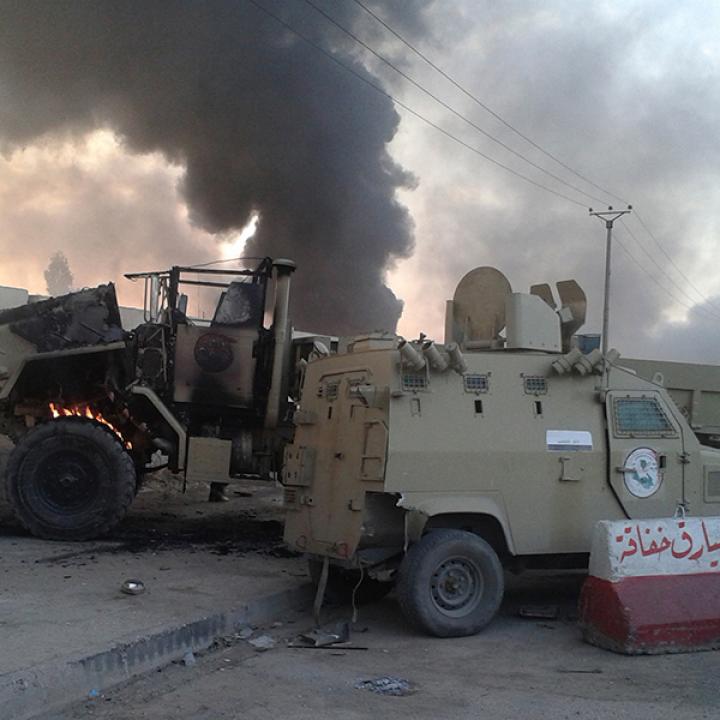
- Policy Analysis
- Fikra Forum
The Cyber Dimensions of ISIS’s Occupation of Mosul

Mentally manipulating the Iraqi security forces by shaping the news and disseminating it online was one of the major pillars of ISIS’ strategy to occupy Mosul. The fall of Mosul on June 10 2014, followed by the fall of Nineveh and other Iraqi provinces, was especially notable for ISIS’s use of asymmetric warfare. This was unfamiliar territory for the Iraqi army, which still has not figured out how to train or plan to counter such methods. The preparatory stages of ISIS’s attack on Mosul relied on several tactics: shock and awe, psychological and media warfare, propaganda and organized rumors, and public opinion management, in addition to preparations for the crucial military confrontation. Mosul’s fall was also preceded by a huge wave of organized internet campaigns launched by ISIS through its online posts, which terrorized Iraqi security institutions in Nineveh and the other provinces. As a result, these institutions have significantly weakened - and sometimes collapsed – as ISIS spread its messages on a wide scale among the ranks of the Iraqi defense forces.
This tactic represents a new approach that the group had not used so skillfully in the past. ISIS was able to set the stage for defeat without a major military clash thanks to the psychological defeat imposed on the Iraqi army in Mosul. ISIS’s skillfulness in this regard resulted from its experience in Syria, which was exported to Iraq in order to conquer many territories though virtual warfare. This begs the question: has the Iraqi government, and, in particular, its security institutions learned a lesson? And will they develop a cyber doctrine so as to manage psychological warfare in times of military crises?
ISIS has rendered the virtual world a common platform for targeting ordinary civilians. The group’s non-militant supporters can partake in an online environment where anyone can send and receive information from known or unknown sources. By and large, ISIS has established a huge electronic army working on multiple objectives and separate missions within the framework of a comprehensive strategy. This strategy involves advanced forces specialized in military, social, economic and psychological affairs. These soldiers are the ones to lead the mission targeting individuals through media in order to shape their way of thinking and control general trends along with all their international, regional, and local dimensions.
There are multiple dimensions to asymmetric warfare, and ISIS has established a number of units that specialize in cyberspace and virtual warfare that involve multiple psychological and moral dimensions. They have also developed apps and spread targeted rumors, in addition to preparing for direct military combat. These tactics have been successful because Iraqi forces have not been trained on such types of combat and Iraq has had no interest whatsoever in the cyber field or any modern internet attacks.
Ahead of the attack on Mosul, ISIS published a series of documentaries entitled “Clashing of the Swords” showing operations conducted by ISIS in the various regions where conventional military clashes had been occurring before large swathes of Northern Iraq and major parts of Syria fell into the hands of the group. In order to eventually intimidate and destroy the Iraqi army’s morale, these documentaries contain significant psychological and moral messages that have been professionally conveyed so as to influence the mindset of Iraqi soldiers. Such documentaries serve as tools of media warfare, spreading rumors of the army suffering major reversals in multiple battles and inflating the Iraqi death toll, thus undermining its defensive and offensive military ideology.
ISIS followed this strategy before the fall of Mosul by filming the murders, mass executions, beheadings, and live burials of soldiers while simultaneously issuing online publications that target the largest number of people possible via social media. This was not countered by any Iraqi Army operation seeking to lift the spirits and morale of the Iraqi soldiers. Consequently, ISIS won the psychological war. This was made possible by the absence of any Iraqi defense that could counter and contain ISIS’ attacks. Against the backdrop of documented assassinations along the Baghdad-Mosul road and inside Mosul in broad daylight, in addition to car bombs and IEDs, the army fell into a state of extreme shock and fear. In summary, ISIS has managed to capitalize on the substantial impact of its psychological and media warfare through social media tactics and other means while security forces inside the city were in dire straits.
Moreover, the Iraqi military establishment has been unaware of psychological and cyber warfare mechanisms, focusing instead only on confrontation on the ground. Thanks to its cyber operations, ISIS has been able to achieve major goals before the start of the battle: it has sown fear and terror among Iraqi forces and prepared them for a smooth and rapid defeat in battle.


